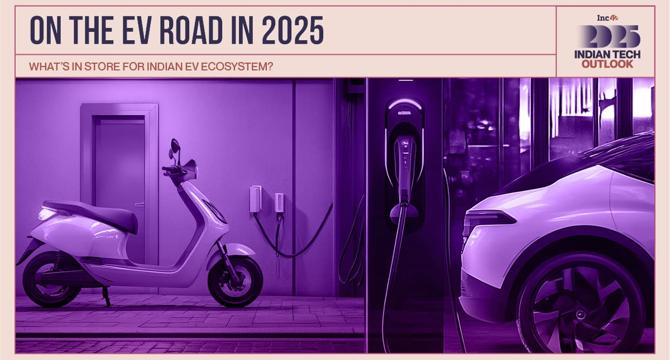Inc42
1M
289

Image Credit: Inc42
EVs In India In 2025: On The Cusp Of An Inflection Point
- India saw several cutting-edge electric vehicle models in 2024 launching in the two and four-wheeler segments, supported by the growing EV charging station network, green energy integration and startup investments. India’s commitment to going green can be seen in schemes such as EMPS (worth INR 770 Cr) and the PM E-DRIVE scheme (INR10,900 Crore) projected to sell 2.88 million vehicles by 2025. EV IPOs, mergers, EV infrastructure, and new launches spell immense possibilities for the Indian EV market in 2025.
- Ather Energy and Ampere Electric are India’s top two electric two-wheeler manufacturers expected to land on the stock exchanges in 2025. While both show promise, Ather holds a competitive edge due to its high-performance vehicles, in-house developed technology, and superior product quality.
- Honda, Nissan, and Mitsubishi are reported to merge under a joint holding company to establish the world’s third-largest automaker by 2026. The merger will optimise shared resources and technologies, with a particular focus on EV development, expected to advance EV launch and hybrid-electric vehicles in India.
- As of November 2024, India witnessed a doubling of public EV charging points across the country to 25,202 stations, and further boost is expected with the INR 2000 Cr allocation, the Hero Electric-BOLT partnership to set up 50,000 charging stations by 2025. Experts predict public-private collaborations driving advancements in EV infrastructure.
- Mahindra unveiled two EV models – BE 6 and XEV 9E, coming up for sale in late January 2025. Maruti Suzuki's eVX (Vitara), Tata Harrier EV and Hyundai’s Creta EV are mass-market vehicles set to debut in 2025
- Tesla plans to introduce a “Redwood”, a mass-market EV, locally manufactured and targeted at Indian consumers. BYD with massive plans including a Rs 20,00,000 electric sub-compact SUV by 2025 and launching electric models like BYD eMAX 7 and Seagull. However, strict Indian investment rules have halted BYD’s $1 Billion investment plans.
- EV launches with advancements in battery technologies and extended driving ranges are expected to push legacy automakers to innovate more aggressively, leading to new customer expectations, and significantly accelerating EV adoption in India.
Read Full Article
17 Likes
For uninterrupted reading, download the app